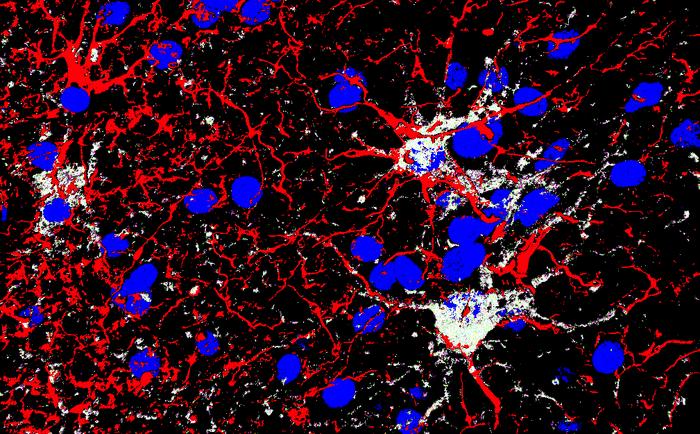Researchers from Helmholtz Munich and the LMU have discovered that, in the case of brain injuries, specific cells in the brain become active in disease situations, exhibiting properties of neural stem cells. The authors further discovered that a specific protein regulates these cells and hence could function as a target for therapy and thereby contribute to better treatments for brain injuries in the future. The new findings shed light on the specificity of astrocyte reaction in different injury conditions and the results are now published in Nature Medicine.

Credit: Helmholtz Munich – (c) Swetlana Sirko
Researchers from Helmholtz Munich and the LMU have discovered that, in the case of brain injuries, specific cells in the brain become active in disease situations, exhibiting properties of neural stem cells. The authors further discovered that a specific protein regulates these cells and hence could function as a target for therapy and thereby contribute to better treatments for brain injuries in the future. The new findings shed light on the specificity of astrocyte reaction in different injury conditions and the results are now published in Nature Medicine.
The onset and progression of neurological disorders, such as trauma, stroke, epilepsy, and a variety of neurodegenerative diseases lead to irreversible loss of neurons resulting in strong impairments of brain function. Even though the prevalence of these disorders is steadily increasing worldwide, effective treatment options are still lacking. Treatment options are very limited due to the fact that lost neurons cannot be replaced, and the injury environment may not be supportive for recovery.
However, previous preclinical research has revealed a promising response involving a specific type of glial cells – a vital component of the nervous system alongside neurons, known for their role in supporting and safeguarding neurons – the star-shaped astrocytes. They have demonstrated the ability to resume cell proliferation, a mechanism crucial in shielding the injury-affected brain from invasion by immune cells. Moreover, some of these astrocytes acquire neural stem cell properties. Stem cells are cells that self-renew and can generate different cell types of an organ. Thus, neural stem cells can self-renew and generate neurons and glial cells. These cells have been detected in the murine brain after injuries such as trauma or stroke, which are disease conditions where the tight blood-brain barrier (BBB) is disrupted and blood or cerebrospinal fluid, a protective fluid surrounding the brain, can enter.
Distinct Astrocyte Reaction Reveals Novel Biomarkers and Source for Repair in the Human Brain
Scientists around Prof. Magdalena Götz from Helmholtz Munich and the Ludwig-Maximilians-Universität München (LMU) revealed that in the adult human brain astrocytes start to proliferate and acquire neural stem cell properties once a disease-related disruption of BBB occurs, and that this pathology-specific astrocyte plasticity at the injury site is tightly correlated with upregulation of a protein named Galectin 3 serving as a new marker for proliferating human astrocytes.
Dr. Swetlana Sirko, the first author of the study, further explains: ”Given the importance of astrocyte proliferation in clinical evaluations of neuropathological state in patients, our findings are relevant diagnostically, but also add to our understanding of how diagnosis-specific changes in composition of cerebrospinal fluid, and in particular an upregulation of Galectin 3 binding protein (LGALS3BP) support the maintenance of astrocyte plasticity in human brain. Despite the exact mechanisms remaining to be elucidated, the identification of Galectin 3-LGALS3BP axis as an inducer of astrocyte plasticity might largely contribute to the discovery of biomarkers for proliferative astrogliosis prediction and their beneficial modulation within affected brain parenchyma.”
By uncovering two pivotal regulators of astrocyte proliferation following injury, the researchers have laid a cornerstone for the future clinical applicability of these biomarkers as potential indicators for detecting a beneficial reaction of glial cells, but most importantly identified the presence of cells with stem cell potential in the brains of patients. The study highlights the importance of understanding glial cell reaction to injury. Magdalena Götz, corresponding author of the study, emphasizes: “Our analysis with this allegedly boring support cell type, now showed the presence of neural stem cells in the brains of patients with trauma or stroke. This is an exciting novel cell source for replacing lost neurons.”
Original publication
Sirko et al. (2023): Injury-specific factors in the cerebrospinal fluid regulate astrocyte plasticity in the human brain. Nature Medicine DOI: 10.1038/s41591-023-02644-6
About Helmholtz Munich:
Helmholtz Munich is a leading biomedical research center. Its mission is to develop breakthrough solutions for better health in a rapidly changing world. Interdisciplinary research teams focus on environmentally triggered diseases, especially the therapy and prevention of diabetes, obesity, allergies, and chronic lung diseases. With the power of artificial intelligence and bioengineering, researchers accelerate the translation to patients. Helmholtz Munich has more than 2,500 employees and is headquartered in Munich/Neuherberg. It is a member of the Helmholtz Association, with more than 43,000 employees and 18 research centers the largest scientific organization in Germany. More about Helmholtz Munich (Helmholtz Zentrum München Deutsches Forschungszentrum für Gesundheit und Umwelt GmbH): www.helmholtz-munich.de/en
Journal
Nature Medicine
DOI
10.1038/s41591-023-02644-6
Method of Research
Experimental study
Subject of Research
Human tissue samples
Article Title
Injury-specific factors in the cerebrospinal fluid regulate astrocyte plasticity in the human brain
Article Publication Date
8-Dec-2023




